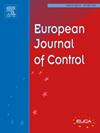通过互联控制有限级量子存储器系统的退相干时间
IF 2.6
3区 计算机科学
Q2 AUTOMATION & CONTROL SYSTEMS
引用次数: 0
摘要
本文研究的是开放量子系统,其动态变量的代数结构类似于有限级系统的保利矩阵。系统的哈密顿和与外部玻色子场耦合的算子线性依赖于系统变量。这些场由量子维纳过程表示,量子维纳过程根据准线性哈德逊-帕塔萨拉蒂量子随机微分方程驱动系统动力学,该方程的漂移向量和分散矩阵是系统变量的仿射和线性函数。这种设置包括零-哈密尔顿孤立系统动力学,作为一种特殊情况,系统变量在时间上是恒定的,这使得它们有可能被用作量子存储器。在更现实的非消失系统-场耦合情况下,当系统变量与其初始值的均方偏差变得相对显著时,我们定义了记忆退相干时间,该时间由加权矩阵和保真度参数指定。我们考虑了退相干时间在系统能量参数上的最大化问题,并得出了零哈密顿提供次优解的条件。我们还讨论了此类系统直接能量耦合互连的优化问题。本文章由计算机程序翻译,如有差异,请以英文原文为准。
Decoherence time control by interconnection for finite-level quantum memory systems
This paper is concerned with open quantum systems whose dynamic variables have an algebraic structure, similar to that of the Pauli matrices for finite-level systems. The Hamiltonian and the operators of coupling of the system to the external bosonic fields depend linearly on the system variables. The fields are represented by quantum Wiener processes which drive the system dynamics according to a quasilinear Hudson–Parthasarathy quantum stochastic differential equation whose drift vector and dispersion matrix are affine and linear functions of the system variables. This setting includes the zero-Hamiltonian isolated system dynamics as a particular case, where the system variables are constant in time, which makes them potentially applicable as a quantum memory. In a more realistic case of nonvanishing system-field coupling, we define a memory decoherence time when a mean-square deviation of the system variables from their initial values becomes relatively significant as specified by a weighting matrix and a fidelity parameter. We consider the decoherence time maximization over the energy parameters of the system and obtain a condition under which the zero Hamiltonian provides a suboptimal solution. This optimization problem is also discussed for a direct energy coupling interconnection of such systems.
求助全文
通过发布文献求助,成功后即可免费获取论文全文。
去求助
来源期刊

European Journal of Control
工程技术-自动化与控制系统
CiteScore
5.80
自引率
5.90%
发文量
131
审稿时长
1 months
期刊介绍:
The European Control Association (EUCA) has among its objectives to promote the development of the discipline. Apart from the European Control Conferences, the European Journal of Control is the Association''s main channel for the dissemination of important contributions in the field.
The aim of the Journal is to publish high quality papers on the theory and practice of control and systems engineering.
The scope of the Journal will be wide and cover all aspects of the discipline including methodologies, techniques and applications.
Research in control and systems engineering is necessary to develop new concepts and tools which enhance our understanding and improve our ability to design and implement high performance control systems. Submitted papers should stress the practical motivations and relevance of their results.
The design and implementation of a successful control system requires the use of a range of techniques:
Modelling
Robustness Analysis
Identification
Optimization
Control Law Design
Numerical analysis
Fault Detection, and so on.
 求助内容:
求助内容: 应助结果提醒方式:
应助结果提醒方式:


